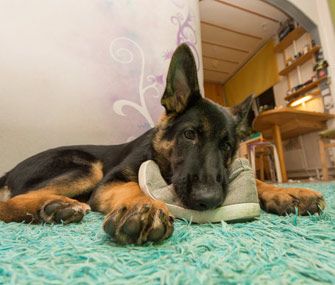German Shepherds are a very intelligent herding breed known for managing wooly charges like sheep. These dogs need to be entertained and driven by activities to avoid chewing on things like couch cushions when bored or teething. Give them problem-solving games to keep their minds sharp and stop them from chewing.
Why Dogs Chew
Dogs have a genetic code that drives them to hunt, kill, and catch prey like a rabbit. Even a tiny teacup Chihuahua has this predatory drive because they were bred through evolution to survive by catching food. At home, this trait lingers in activities where Sparky might sniff a trail, stalk his prey, chase, grab, and even rip apart toys.
Though he’s a pet, Sparky enjoys chewing on things like a couch cushion, expressing his need to dissect and gnaw, mimicking how he would catch and tear his prey into pieces. This behavior shows when he enjoys playing fetch or exercising, a time when he can perform these steps to catch what he chases.
Causes of Destructive Chewing
German shepherds often chew on things they shouldn’t. This is a behavior known as destructive chewing. Finding out the cause behind this can take some detective work. Understanding what is triggering this action helps us create strategies to prevent and manage it. This is one of the common problems many owners face.
Lack of Exercise
German Shepherds are herding dogs and are very active. They need a lot of physical movement. If they don’t get enough exercise, they can become frustrated and bored. This can lead to destructive chewing. To prevent this, make sure your dog exercises twice a day for an hour each time. The intensity of the exercise should match their age and physical condition. If they have any health problems, increase their activity carefully.
Consider hiring a professional dog walker or enrolling them in a class. Activities like swimming, dock diving, playing fetch, frisbee, and fitness rings are great. They can also enjoy an agility course, find objects, tug of war, or flirt pole. Playing with other dogs is also a good way to keep them active and happy.
Lack of Mental Stimulation
German shepherds are very smart dogs that need lots of exercise to keep their minds and bodies healthy. They love being outdoors and exercising in the fresh air. This kind of activity not only reduces boredom but also increases their confidence and strengthens the bond between you and your pet.
Mental stimulation can reduce anxious behavior and prevent destructive chewing. It’s fun to provide challenges for them. Every day, try to burn off their energy so they can relax easier. You can teach your dog new tricks, join a training club, or even hire a trainer.
If you prefer self-help, there are many videos and books that offer opportunities to train your German shepherd with both simple and complex basic obedience techniques.
Separation Anxiety
German shepherds are like Velcro dogs because they form strong bonds with their owners. They are prone to separation anxiety when left alone all day. This can trigger many symptoms like destructive chewing, whining, howling, barking, pacing, restlessness, digging, trying to escape, inappropriate urination, and defecation.
If your dog shows these signs, it’s a good idea to check with a vet to rule out any health problem. Whether the problem is mild or severe, treatment can help. Keeping your dog active with plenty of exercise, soothing chews, and safe chew toys can help. Also, counterconditioning is a method for dealing with this.
Sometimes, getting professional help from a trainer or behaviorist can greatly reduce these behaviors. Make sure to spend quality time with your dog before you leave and when you return home. Always make sure they are fed and had a bathroom break. Greet them with an upbeat voice and give a high-value treat. If you work long hours, consider hiring someone to check on them.
Stress and Frustration
When dogs feel stress and frustration, it might trigger destructive chewing. This is a clever way they use to communicate their situation. They want your attention or want to go and play. If they are ignored, they may feel confined and act out.
To help and prevent this type of behavior, always make sure they get enough exercise and playtime to burn off their excess energy. A firm, yet gentle, correction and redirection to an appropriate item can be helpful. If confining your dog to one place, command them to stay calm. This approach is always useful, especially if they’re recovering from an injury or during ongoing home repairs involving workers in the yard.
Medical Cause
Excessive chewing in dogs can sometimes be a sign of a chewing disorder or canine pica. This happens when a dog eats non-nutritional objects. Conditions like anemia, gastrointestinal diseases, and neurological diseases can cause persistent chewing. Dogs with diabetes or on medications like prednisone may also chew more.
A behavioral disorder from a stressful home environment, absent parent, or competition for resources can lead to destructive chewing. Visiting a veterinarian for a thorough physical exam, including blood tests, a fecal test for gastrointestinal parasites, and checking for pancreatic diseases and liver diseases, can help rule out medical causes and stop chewing.
Knowing the types of diets and nutrition can help prevent abnormal chewing. Observing signs of issues early helps manage destructive chewing.
How to Stop Your German Shepherd From Destructive Chewing
To stop your German Shepherd from destructive chewing, first understand the causes. German Shepherds may chew due to boredom, lack of exercise, or behavior problems. Dig deeper into your dog’s behavior to find the right solutions. A combination of these steps can help reduce excessive chewing in your GSD.
1. Dog-Proof Your Home
To stop destructive chewing, you need to dog-proof your home. Train your puppy by using positive reinforcement techniques and curbing bad behaviors. Teach your dog to understand the difference between a toy and a pillow. Reward your pet with a delicious treat every time they chew the right object.
Supervise their movements around the house to ensure they do not chew on things out of bounds. With patience and discipline, they will learn not to exhibit excessive chewing and understand what they can chew and what they can’t. Allow your GSD into each room one at a time to make them understand they cannot use certain objects.
This method helps in discouraging the behavior and prevents valuable and dangerous objects from being destroyed. Using these techniques from months old can help your German Shepherd to be assimilated fully and demand less supervision later in life.
2. Redirect Destructive Chewing to Chew Toys
Your dog has a natural tendency to chew on valuables. To stop this, provide healthy alternative toys for chewing. Evaluate your GSD’s chewing behavior and determine the type of chewer they are to decide the best chew toys. Preventive Vet suggests rotating toys to avoid habituation.
This stimulation ensures their welfare and keeps them from chewing on things they aren’t supposed to. Training can help eliminate destructive chewing and correct the behavior, leading to a healthy and happy dog. Chewing is a natural need for dogs, and if chewing is indicated earlier, it can be prevented and corrected effectively.
3. Train Your GSD to Obey Anti-Chew Commands
To stop destructive behavior, teach your German Shepherd to obey anti-chew commands. When you notice your dog trying to chew a non-chew object like wooden furniture, give the command “leave it” to help deter the temptation.
This deterring method draws their attention away from the object. Reward your dog with a treat or their favorite chew toy and say “GOOD DOG” when they heed the command. This praise makes them understand that not chewing the shoe or other items in your home is expected. Consistent obedience training ensures they will stop this behavior.
4. Keep Your German Shepherd Well-Exercised
A German Shepherd is a high-energy and smart dog that needs plenty of exercise. Morning walks and evening walks provide both physical stimulation and mental stimulation. Without these outlets, they can become bored, frustrated, and exhibit destructive behavior like excessive chewing.
Regular play and training exercises are essential for puppies and adult dogs to prevent dog anxiety, separation anxiety, and noise sensitivity. Under-exercised German Shepherds often show high energy and smartness in negative ways. Daily exercise is crucial to keep them happy and healthy.
5. Contain Your Dog When He is Alone
When your German Shepherd is home alone, it is important to contain them safely. Use a crate like the Midwest Homes for Pets iCrate from Amazon, which has double doors and a single-door option in size 48″. This gives your GSD enough room to move around and stretch out comfortably.
Place toy chews inside to keep your dog busy and occupied. You can also use baby gates or a dog pen to segregate a special place in the house for them to relax and sleep after an exercise session. Consider hiring a dog walker or a professional trainer if you are away for many hours. This prevents self-destructive behavior like biting and chewing, and keeps them from hurting their teeth and mouth.
6. Maintain Your Dog’s Annual Vet Schedule
Chewing can be destructive and may be caused by medical conditions like anemia, diabetes, or gastrointestinal diseases. A German Shepherd might suffer from extreme consequences without proper care. An annual vet visit is crucial to keep your GSD healthy. This schedule helps in early diagnosis and treatment of any condition. If your dog is suffering from psychological anxiety, a behavioral therapist might be advised for proper professional therapy.
Conclusion
German Shepherds are one of the dog breeds that exhibit normal, instinctual, exploratory behavior like chewing. To eliminate this, provide alternative chew objects and keep your dog well-exercised. Chewing helps dogs with relief from teething discomfort and strengthens their teeth and jaws. However, constant chewing on valuables can cause harm.
Abnormal, destructive chewing often results from poor training, puppyhood issues, anxiety, insufficient exercise, boredom, frustration, or attention-seeking behavior. Ensure your GSD follows their annual vet schedule to rule out any predisposing medical conditions. Using anti-chew deterrents, teaching commands, and keeping your dog in his cage when necessary are effective ways to stop your German Shepherd from chewing.
FAQs
How do I get my German Shepherd to stop chewing on everything?
To stop your German Shepherd from chewing on everything, ensure they get plenty of play and exercise. Physical activity helps burn off excess energy. Provide appropriate chew toys to help them kick the chewing habit. Separation anxiety can also be a cause of chewing, so keep your dog engaged when you’re away.
At what age do German Shepherds stop chewing?
The destructive chewing stage in German Shepherds can last until they are around 2 years old. In most cases, this behavior will end by the time they reach 2 years old. However, each dog is different, and some may stop chewing earlier or later. It is important to train your dog to prevent destructive chewing during this stage.
How to punish a dog for chewing up something?
When your dog is chewing something they shouldn’t, interrupt the behavior with a loud noise. Then, show them what is acceptable to chew by giving them a toy. Offer the toy and play with them until they take it in their mouth. Remember to have realistic expectations and be patient as they learn.
.
Does vinegar stop dogs from chewing?
Apple cider vinegar (ACV) has a strong scent and an unpleasant, bitter, sour taste that can stop your dog from chewing. You can spray it on items you want to protect. ACV is a natural pest control and won’t harm your dog if they lick it. This simple solution can help keep your home safe from chewing damage.



